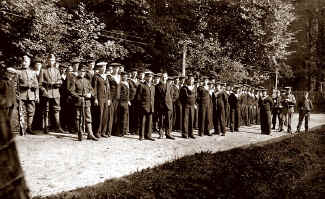|
to
English Camp page
next page
|
State of Siege declared in Groningen
The English Camp in Groningen 1914
- 1918 (part 9)
This is the ninth article from a series of 13 on the history of the English Camp in Groningen, Holland, where 1,500 British servicemen were interned during the Great War 1914 – 1918.
 |
| British internees standing to attention prior to setting off for church on a
Sunday, on the access road to the English Camp. The Sterrebos woods in the background. Anglicans held a service in the great hall of the
barracks. At 9 a.m., non-conformists marched under guard (see picture)
to) the Wallonian Church, Roman Catholics left for St Joseph’s Church half an hour later. |
On arrival in Groningen, many Britons were not going to be locked into a camp. The British minister for War, Lord Kitchener, had said: 'Your country needs you!’ Fifteen British officers had escaped by the end of 1914. Seven of them (one dressed as a woman) managed to escape through the ports of Harlingen, Rotterdam and Flushing. Others were apprehended. When other British officers had taken back their word of honour not to escape, all officers (except commodore Henderson) were transferred to a fortification at Bodegraven, between Utrecht and Leyden, and to Urk, at that time still an island in the Zuiderzee. They remained there until May 1916, when a separate arrangement was made with the British government.
One British officer, called Rainey, finally managed to escape from Urk. He simulated psychiatric problems, and was transferred for further investigations to an army base in The Hague. He would be allowed out, accompanied by a Dutch guard. He had to sign a declaration, stating that he ‘swore on his oath of honour not to escape’. He typed his own declaration, which stated that he ‘swore on his oath of honour to escape’. This was not spotted during a check, and Rainey managed to escape to England. Protestations from the Dutch authorities were to no avail. The British government expressed its regrets, but stated that Rainey had not broken his word of honour, and would not be returned.
As early as November and December 1914, many Groningers felt sorry for those British lads, locked in that camp. They were prepared to help them with civilian clothes, money and transport, to aid their return to the UK. The Dutch guardsmen would also be inclined to look the other way when another Brit jumped over the fence. In order to prevent this sort of help, a State of Siege was declared in January 1915 in all areas housing an internment camp. This transferred local authority control to military authorities. As a result, an order was issued which forbade the civilian population to aid escapees. The most important of the 20 articles in the order read: “It is forbidden to sell, swap, barter with internees items of civilian clothing, bicycles, horse drawn or motorised vehicles, boats or ice skates.”
Nonetheless, the help continued, and people were convicted for aiding internees. This included supply of clothing and bicycles, accompanying to another town, speaking for an internee and giving shelter. Punishment varied from 14 to 90 days’ imprisonment. There were allegations against an British man in Rotterdam, who was thought to be organising transfer to England. There was insufficient evidence against people like W. Ewens. Stories from escapees do suggest that transfers were organised.
A total of 91 British attempted to escape in 1915, of whom 37 actually made it. In May 1916, the British government decided to return every escaped internee to Holland. They probably wanted to be rid of all the problems that the escapees caused with the Dutch government.
Next: The escape by John Henry Bentham
  to
English Camp page to
English Camp page
|
|